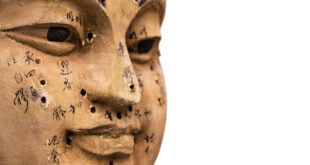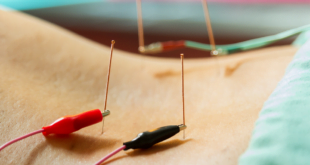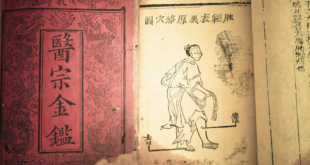Acupuncture is often viewed as a strange form of therapy originating from East Asia where they are all Buddhists. This is far from the truth! There is now some proof with the discovery of the frozen Ötzi tattoo man found in the Italian Alps in 1991 that acupuncture may have been around in Europe over 5,000 years ago. Therefore, acupuncture may not necessarily belong to East Asia. What is known is that its use has been well-documented in East Asia for over 2,000 years and it has a long and successful history. When people think of acupuncture, they tend to think of China. However, acupuncture has been practised all over East Asia, including Japan, Korea and Vietnam. It is therefore not the sole property of the Chinese, though they had the most influence in its development.
Acupuncture probably originated in ancient times through massage (acupressure and scraping), when people would massage a point on the body and found that it helped another part of the body that was in discomfort. People in East Asia then added their unique understanding and awareness of Nature to these points to give us the acupuncture we know today.
The technology used to make acupuncture needles, or rather pins, has evolved over the centuries from stone, to thick needles to the ultra-fine pins we use today. In the West, these ultra-fine pins are just used once and then disposed of in a special container (sharps box), which is then incinerated for health and safety reasons.
A country’s success is greatly influenced by the medicine it uses. Its fertility and pregnancy rate are all largely dependent upon the healthcare system practised within that country. The Chinese population are successful in all these areas of life, due to their cultural awareness of Nature, diet, lifestyle and the medicine they use. It is therefore no wonder that the Chinese have the largest population in the world. This is largely thanks to Chinese medicine.
How does acupuncture work?
Acupuncture is made up of points on the body where the energy can be influenced. These points connect together to form the channels (meridians). These channels look like the underground (tube or metro) map, with lots of different lines crisscrossing each other. The stations are like the acupuncture points. Each point has an associated health property. By inserting a pin into the acupuncture point, it tells the body to initiate a healing response.
Generally, acupuncture is good at helping to regulate energy and blood flow throughout the body. When these two important aspects of the body are regulated, the body is able to heal itself and return to a state of balance (known as ‘homeostasis’ in Western medicine). During an acupuncture session, you may go into a deep state of relaxation where you are able to switch off from your worries and stresses, allowing the body to heal itself.
Today there are currently two theories as to how acupuncture works and what makes up the acupuncture points and channels. Within Western medical thinking, it is believed acupuncture works on the nervous system, hence its ability to relieve pain. However, this theory is not recognised within the acupuncture community, or in East Asia, because acupuncture is able to do a lot more than just relieve pain. A better theory originates from Korea, where researchers believe they have found the channels anatomically within the body. They believe they have observed the acupuncture channels running within the lymphatic (immune) system. Other research conducted in Belgium also found the same structures.
How will I feel after having acupuncture?
The most noticeable effect people feel after having acupuncture treatment is a great sense of calmness, a relief of a discomfort they may have experienced and a rejuvenation in their well-being. Some even sleep during acupuncture treatment, which can restore their energy levels. Some people say they feel a bit light-headed after, which is normal. I find that the more the person relaxes during treatment while lying on the couch, the better the acupuncture works. After having acupuncture, it is safe to drive or go back to work. However, most people like to have acupuncture after work as they often feel too relaxed to want to return to work.
How often do I need to have acupuncture?
Acupuncture is a dose like every other medical treatment. Its effects last for around three to four days and then it needs to be repeated. If you are suffering from morning sickness or other chronic pain, it is ideal to have acupuncture twice a week. Otherwise, you can have acupuncture once a week. Having acupuncture less frequently than once a week is not advisable because its effects will be minimal.
Does it hurt?
Some people do not like the idea of needles and worry that acupuncture will hurt. This fear of needles normally comes from bad memories after having a blood test or a vaccination. Having acupuncture is not the same as having a blood test, as the acupuncture pin is a lot thinner – as fine as a human hair (you can fit 20 acupuncture needles into one syringe) – and is not inserted into a vein but rather a muscle.
Some people will feel the acupuncture pins more than others. This is often due to a lack of energy. The weaker the person is, the more sensitive they are and the more they will feel the pin breaking the skin, causing a tiny prick sensation. When the pin hits the acupuncture point, the sensations a person can feel are unlike anything you have normally felt and can be:
- a deep feeling of relaxation
- a dull throbbing ache
- a pulling sensation
- a tingling sensation
- an electrical sensation that travels along the body
What will happen during an acupuncture treatment?
During an acupuncture treatment, a case history will be taken, which will involve answering a lot of questions. This can take between 30 to 90 minutes and will invovle looking at your tongue and checking your pulse. After this has been completed, you will have acupuncture pins inserted into specific points upon your body. The acupuncture pins are left inserted from between 20-60 minutes, depending upon the acupuncturist treating you.
 Acupuncture Times Read the latest acupuncture research articles about acupuncture, Chinese herbal medicine, cupping therapy and moxibustion.
Acupuncture Times Read the latest acupuncture research articles about acupuncture, Chinese herbal medicine, cupping therapy and moxibustion.



